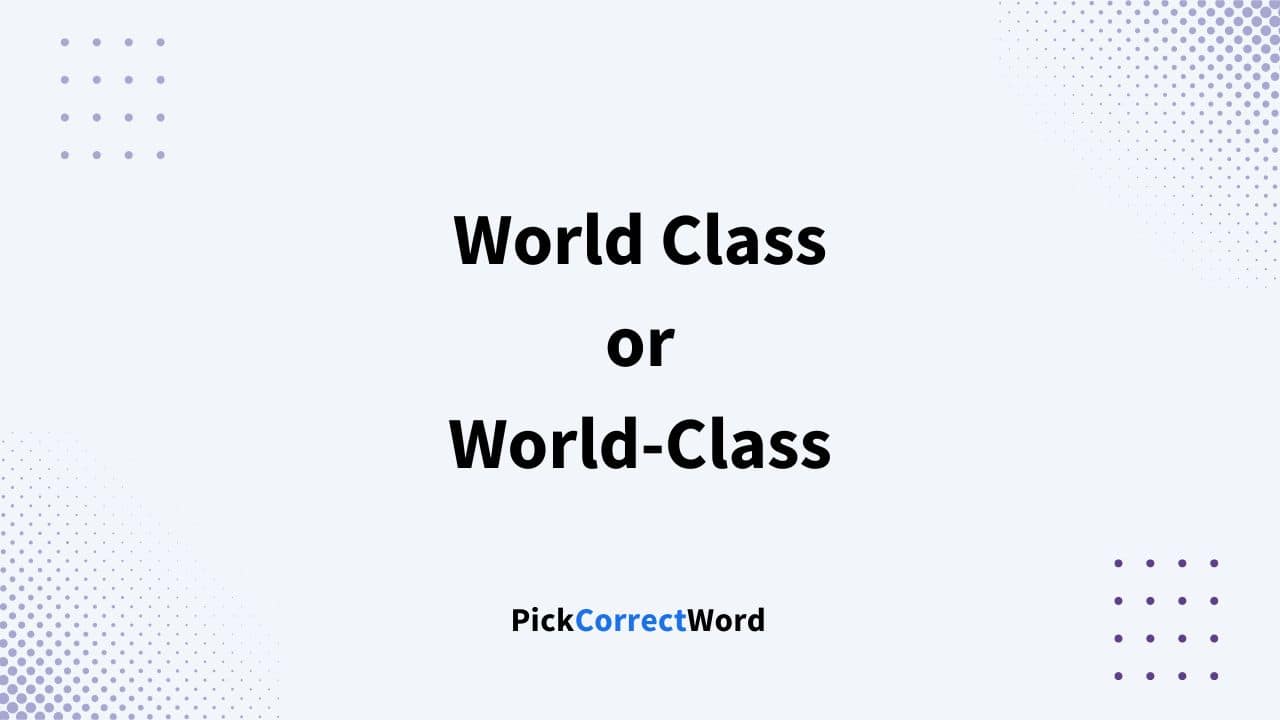When you’re writing about someone or something that’s top-notch globally, you might be unsure whether to use ‘world class’ or ‘world-class’.
If you want to use the term as an adjective, you should use world-class. This is the version that most dictionaries agree on when you’re talking about something that’s of the best quality, just like the best in the world.
Using world class without the hyphen isn’t typical and most English language experts would advise against using it.
World Class or World-Class? Which is Correct?
‘World-class’ is the correct way to use it when you’re using it as a describing word directly before a noun. Using ‘world class’ without a hyphen is generally seen as a mistake.
Dictionaries like the Cambridge Dictionary back this up by defining ‘world-class’ as a describing word that means someone or something is among the best in the world in a particular area.
The hyphen in ‘world-class’ shows that the two words work together as one describing word.
If you write ‘world class’ without the hyphen before a noun, it’s not clear if you’re using both words together as an adjective or talking about a ‘class’ that has some connection to the ‘world.’
Examples of Each
- As a Noun (No Hyphen):
- You might take a half day off from work to attend a personal event.
- As an Adjective (With Hyphen):
- Your company might offer a half-day training session for new employees.
World-Class: Meaning and Usage
The Cambridge Dictionary identifies ‘world-class’ as an adjective, indicating that something or someone referred to in this way is top-tier globally. The words ‘world’ and ‘class’ combine to express a single concept (the quality).
From a grammar perspective, when you use any word as a compound adjective before a noun (to describe something), you usually join it with a hyphen. This makes it clear that the phrase works as a single descriptor.
- For example: “She is a world-class runner.”
Using ‘world class’ without the hyphen isn’t common in English grammar as it can often cause confusion. Dictionaries, including Oxford, typically show the hyphenated form as the norm. So, it’s hardly ever used in everyday English.
Examples of Using “World-Class“ in A Sentence
The university is known for its world-class research facilities.
He is a world-class chef with restaurants all over the globe.
The team is training hard to deliver a world-class performance at the Olympics.
The city is home to several world-class museums.
Their company provides world-class customer service.
The hotel offers world-class amenities to its guests.
Frequently Asked Questions
Is it world class or world leading?
“World class” implies a level of quality that ranks among the best globally, whereas “world leading” suggests being at the very forefront in a particular field or industry. Both terms are used to denote high standards, with “world leading” often signifying a singular top position.
Is world-class an adjective?
Yes, “world-class” is an adjective that describes something or someone as among the best in the world. It’s typically hyphenated when used before a noun, such as in “world-class athlete.”
What is the difference between world-class and best in class?
World-class refers to a status that is considered the best globally, transcending regions and industries. “Best in class,” on the other hand, is a term used to describe something that is the best within a specific category, group, or market.


